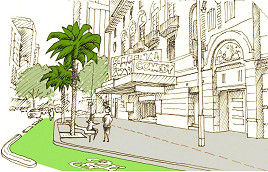Read all about it! The Argus office makes news
Seventy people arrested in Lisbon for taking part in anti-English protests. The attempted poisoning of the Russian Tsar proves to be untrue. Australian and New Zealand mail believed to have been destroyed when a train caught fire in Nebraska is found and rescued.
These were all headlines in the Argus newspaper in January 1890, the year this photograph was taken, the first being an early example of “fake news” in the days when fact-checking could take days, weeks or months.
Perhaps the men lined up reading the broadsheets on the wall of the Argus, a Melbourne institution, were reading about domestic affairs such as wool and wheat prices, or something more sensational, like the delivery to the Governor of Moscow of a woman’s head on a platter. Yes, it’s true. She was believed to be a Nihilist who was assassinated for betraying the cause.
It is also possible that the men are reading about the more prosaic but impending demolition of this building, the “old” Argus office, which also produced the Australasian. The paper launched there in 1846, one of the earliest newspapers in the colony. It was not the first building on the site – there had been a school and residence there in the 1840s – and when it was demolished in March 1890 those who had worked there for decades spoke of the associations that clung to the walls and the vanished faces whose memory had not passed away (Australasian, March 8, 1890).
Reporters and editors were housed on the first floor, compositors and machines used for printing on the ground floor, so the clatter of machinery must have been quite deafening as a new edition went to print, initially on hand machines.
Mornings were hectic at the Argus, which was located on the south side of Collins St between Russell and Swanston streets, where the Regent Theatre is today. Newsboys spilled from the doors eager to tout the latest news headlines around the city. People flocked to the building to read the broadsheets. During wartime they found the latest war news and casualty lists. Election results were posted here. And in a later age, students anxiously awaited their exam results.
Old gave way to new. A grander building was built in this one’s place. Thirty-six years later the site was sold, and the Argus moved to a new site in Elizabeth St near La Trobe St.
Back on the Collins St site a glamorous new theatre – the Regent – went up in its place. •

Council endorses office tower at Flinders Lane despite querying car park demolition






 Download the Latest Edition
Download the Latest Edition